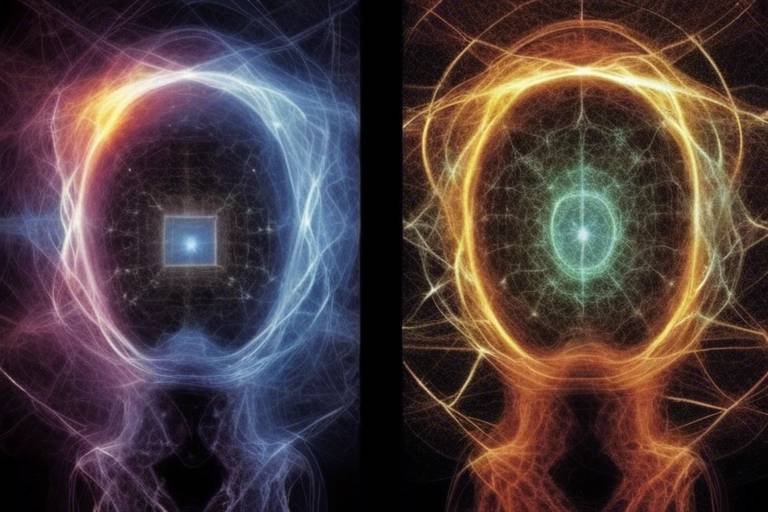Is Metaphysics Critical to Our Perception of Reality?
Metaphysics, often perceived as an abstract and esoteric branch of philosophy, plays a pivotal role in shaping our understanding of reality. But what does that really mean? At its core, metaphysics seeks to answer fundamental questions about existence, the nature of objects, and the relationships between them. This exploration is not just academic; it profoundly influences how we perceive the world around us. Imagine trying to navigate a maze without knowing its layout—this is akin to living without a metaphysical framework. It provides the map that guides our understanding of reality, helping us differentiate between what is tangible and what is merely conceptual.
Consider for a moment how often our beliefs about reality are influenced by metaphysical ideas. For example, the notion of causality—where every effect has a cause—stems from metaphysical inquiry. Without it, our understanding of science, morality, and even personal identity would be drastically different. The questions metaphysics raises—What is being? What is existence?—are not just philosophical musings; they are essential to our daily lives. They shape our worldviews, informing our decisions, our interactions, and our understanding of our place in the universe.
Moreover, metaphysics serves as a bridge between various disciplines. It connects philosophy with science, ethics, and even art. By grappling with metaphysical questions, we open ourselves up to a broader understanding of human experience. The implications of metaphysical beliefs can be seen in everything from the way we interpret scientific findings to how we approach moral dilemmas. Our perception of reality is not just a passive experience; it is an active construction influenced by our metaphysical beliefs.
In essence, metaphysics is not just a theoretical construct; it is a vital part of our cognitive architecture. It shapes our interpretations and influences how we engage with the world. So, is metaphysics critical to our perception of reality? Absolutely. It is the lens through which we view existence, providing clarity and depth to our understanding of the complex tapestry of life. Without it, we would be left with a fragmented view of reality, struggling to make sense of our experiences.
- What is metaphysics? Metaphysics is a branch of philosophy that explores the fundamental nature of reality, including concepts like being, existence, and the universe.
- How does metaphysics influence our daily lives? Metaphysical beliefs shape our understanding of morality, purpose, and human experience, guiding our decisions and interactions.
- Is metaphysics relevant to science? Yes, metaphysical assumptions underpin many scientific theories, influencing how we interpret data and understand the natural world.
- Can metaphysics help with personal identity? Absolutely! Our understanding of self is deeply rooted in metaphysical inquiry, affecting how we perceive our existence and relationships.

The Foundations of Metaphysics
Understanding the basic principles of metaphysics is essential for anyone looking to grasp the deeper layers of reality. At its core, metaphysics is the branch of philosophy that seeks to answer fundamental questions about existence, reality, and the nature of things. It probes into the very essence of what it means to be, examining concepts that are often taken for granted. Imagine metaphysics as the framework of a house; without a solid foundation, the entire structure risks collapse. In this case, the foundational concepts of metaphysics include ontology, the study of being; cosmology, the study of the universe; and epistemology, the study of knowledge.
Historically, metaphysics has roots that stretch back to ancient civilizations, where philosophers like Aristotle and Plato laid the groundwork for future inquiries. Aristotle's work, for example, introduced the idea of substance and essence, which are still pivotal in contemporary metaphysical discussions. Plato, on the other hand, explored the realm of forms, positing that the physical world is just a shadow of a more profound, unchangeable reality. These early thinkers set the stage for centuries of debate and exploration, influencing not just philosophy but also science, religion, and art.
In modern times, metaphysics remains crucial in various fields. For instance, in science, the assumptions we make about the nature of reality often stem from metaphysical beliefs. Questions like "What is time?" or "What is causality?" are not just scientific inquiries; they are deeply metaphysical. Moreover, metaphysics serves as a bridge between the abstract and the tangible, helping us comprehend concepts that are difficult to visualize. It challenges us to think beyond the surface, to explore the 'why' behind the 'what.'
The significance of metaphysics can be summarized in a few key points:
- Framework for Understanding: It provides a structure for exploring complex ideas about existence.
- Influence on Other Disciplines: Metaphysical concepts impact science, ethics, and even everyday decision-making.
- Encourages Critical Thinking: Engaging with metaphysical questions fosters deeper analytical skills.
In conclusion, the foundations of metaphysics are not just academic; they resonate through our daily lives and shape our understanding of the universe. By delving into these principles, we can better appreciate the intricate web of reality in which we exist. Whether we realize it or not, our metaphysical beliefs influence our perceptions, guiding us through the complexities of life.

The Role of Perception
Perception is not just a passive reception of stimuli; it is a dynamic process that shapes our understanding of reality. Imagine walking into a room filled with different colors, sounds, and smells. Each of these sensory inputs interacts with your mind, creating a unique experience that is distinctly yours. This is where metaphysics plays a crucial role, as it provides a framework for understanding how we interpret these sensory experiences. But what does it really mean to perceive something? Is it merely seeing, or is it something deeper?
At its core, perception is influenced by a myriad of factors, including our belief systems, cultural backgrounds, and even our personal experiences. For instance, two people can witness the same event but interpret it differently based on their individual perspectives. This divergence raises an important question: how much of what we perceive is shaped by our metaphysical beliefs? Are we filtering our experiences through a lens that has been constructed by our understanding of reality?
To unpack this further, we can consider the distinction between subjective and objective reality. Subjective reality refers to how we personally interpret the world around us, while objective reality is the external world that exists independently of our perceptions. This relationship is critical in metaphysics because it challenges us to think about the nature of truth. Is truth something that exists out there, or is it constructed through our perceptions?
Furthermore, our perceptions are not just influenced by our individual experiences; they are also shaped by the cultural contexts we inhabit. Different cultures have unique metaphysical beliefs that can drastically alter how reality is perceived. For example, in some Eastern philosophies, the concept of reality is fluid and interconnected, whereas Western philosophies often emphasize a more compartmentalized view of existence. This cultural lens can significantly impact how individuals interpret their experiences and what they consider to be real.
Incorporating these insights into our daily lives can lead to a richer understanding of our experiences. By recognizing that our perceptions are influenced by both internal beliefs and external contexts, we can become more open to different interpretations of reality. This awareness can foster empathy and understanding, allowing us to appreciate the diverse ways in which people experience the world.
In summary, perception is a complex interplay of sensory input, personal belief, and cultural context. It challenges us to question our assumptions about what is real and encourages a deeper exploration of our own metaphysical beliefs. As we continue to navigate our lives, embracing this complexity can lead us to a more profound understanding of ourselves and the world around us.
- What is the difference between subjective and objective reality? Subjective reality is based on personal perceptions and experiences, while objective reality exists independently of our interpretations.
- How does culture influence perception? Cultural beliefs and practices shape how individuals interpret their experiences, leading to different understandings of reality.
- Can perception change over time? Yes, as we gain new experiences and knowledge, our perceptions can evolve, affecting how we view reality.

Subjective vs. Objective Reality
When we dive into the depths of metaphysics, one of the most intriguing discussions revolves around the concepts of subjective and objective reality. At first glance, these terms might seem straightforward, but they encapsulate a world of philosophical debate and inquiry. So, what exactly do we mean when we talk about subjective and objective realities? Simply put, subjective reality refers to how individuals perceive and interpret the world based on their personal experiences, emotions, and beliefs. In contrast, objective reality is the idea that there exists a reality independent of our perceptions—an external world that remains constant regardless of individual perspectives.
This distinction is crucial for understanding how we navigate our lives and shape our beliefs. For instance, consider how two people can witness the same event but leave with completely different interpretations. One might see a heated argument as a sign of passion, while another might interpret it as a sign of aggression. This divergence illustrates the essence of subjective reality, where personal experiences color our understanding of events. On the other hand, objective reality posits that there are facts that exist outside our interpretations—like the laws of physics, which govern the universe regardless of our beliefs.
To further clarify, let's break down some key differences:
| Aspect | Subjective Reality | Objective Reality |
|---|---|---|
| Definition | Personal interpretations and experiences | External facts and truths independent of perception |
| Examples | Emotions, beliefs, cultural influences | Scientific laws, physical properties |
| Impact | Shapes individual perspectives and experiences | Provides a universal framework for understanding reality |
Now, you might wonder, how do these concepts influence our understanding of truth? Well, the interplay between subjective and objective realities can lead to fascinating discussions about what we consider to be truth. For instance, if two people have differing views on a political issue, whose perspective is the "truth"? This is where metaphysical inquiry comes into play, as it challenges us to think critically about the nature of reality and our place within it.
Moreover, the implications of this distinction extend beyond philosophical musings. In our daily lives, recognizing the difference between subjective and objective realities can foster empathy and understanding. When we acknowledge that others may see the world through a different lens, it opens the door to deeper conversations and connections. Ultimately, navigating the complexities of subjective and objective realities can enrich our relationships and enhance our understanding of the world around us.
In conclusion, the discussion of subjective versus objective reality is not just an academic exercise; it's a vital part of how we interpret our experiences and interact with others. By embracing both perspectives, we can cultivate a more nuanced understanding of reality, leading to greater awareness and compassion in our daily lives.

The Influence of Culture on Perception
Culture plays a pivotal role in shaping our perception of reality. It acts as a lens through which we interpret the world around us, influencing not just our thoughts but also our emotions and actions. When we think about culture, we often envision traditions, languages, and art forms. However, it goes much deeper than that. Culture encompasses the collective beliefs, values, and practices of a group of people, and these elements profoundly impact how we perceive and understand our existence.
Consider this: two individuals from vastly different cultural backgrounds might witness the same event but interpret it in entirely different ways. For instance, a celebration in one culture may be perceived as a joyous occasion, while in another, it could be seen as an opportunity for solemn reflection. This divergence in interpretation underscores the idea that perception is not merely a passive reception of sensory information; it is an active process influenced by our cultural conditioning.
Moreover, metaphysical beliefs often vary across cultures, leading to differing interpretations of reality. For example, some cultures might embrace a more spiritual or mystical understanding of existence, viewing the world as interconnected and infused with meaning beyond the physical realm. Others may adopt a more materialistic perspective, focusing on tangible evidence and scientific explanations. This cultural framework can dictate how individuals approach life's big questions, such as the nature of reality, existence, and even morality.
To illustrate this further, let’s look at a few cultural perspectives on reality:
- Eastern Philosophies: Many Eastern traditions, such as Buddhism and Hinduism, emphasize the concept of interconnectedness, where every being and element of the universe is seen as part of a larger whole. This perspective often leads to a more holistic understanding of reality.
- Western Philosophies: In contrast, Western thought, heavily influenced by Greek philosophy and later scientific rationalism, often prioritizes individualism and a more compartmentalized view of reality, focusing on the separation between the observer and the observed.
- Indigenous Beliefs: Indigenous cultures frequently hold a profound respect for nature and view the natural world as imbued with spirit and significance, leading to a perception of reality that is deeply rooted in the land and ancestral connections.
This cultural influence on perception is not just theoretical; it has tangible implications in our daily lives. For instance, how we approach education, relationships, and even conflict resolution can be traced back to our cultural backgrounds. A collectivist culture may prioritize group harmony and consensus, while an individualistic culture may emphasize personal achievement and self-expression. These differences can create misunderstandings and conflicts when individuals from diverse backgrounds interact.
In conclusion, the influence of culture on perception is a complex and multifaceted phenomenon. It shapes our understanding of reality in profound ways, guiding our thoughts, behaviors, and interactions. By acknowledging and appreciating these cultural differences, we can foster a deeper understanding of one another and enrich our collective experience of reality.
- How does culture shape our beliefs? Culture provides a framework for understanding the world, influencing our beliefs about morality, existence, and the nature of reality.
- Can perception be changed? Yes, perception can be altered through exposure to different cultural contexts, experiences, and education.
- Why is it important to understand cultural influences on perception? Understanding these influences can help us communicate better and foster empathy in a diverse world.

Philosophical Perspectives on Reality
When we dive into the depths of , we uncover a rich tapestry of thoughts and theories that have shaped human understanding for centuries. Imagine standing at the edge of a vast ocean, each wave representing a different philosophical idea crashing against the shore of our minds. From ancient philosophers like Plato and Aristotle to modern thinkers such as Kant and Heidegger, each has contributed unique insights that challenge our perceptions and expand our understanding of existence.
One of the most intriguing aspects of these philosophical perspectives is how they grapple with the nature of reality itself. For instance, Plato introduced the concept of the Theory of Forms, suggesting that the material world is merely a shadow of a higher, unchanging reality. According to him, what we perceive as real is just a reflection of these ideal forms. This notion prompts us to question: Are our senses reliable enough to grasp the true nature of reality, or are we forever trapped in a cave, seeing only shadows?
On the other hand, Aristotle took a more pragmatic approach. He argued that reality is grounded in the physical world, emphasizing the importance of empirical observation and experience. His belief that substance is the essence of reality offers a counterpoint to Plato's idealism. In Aristotle's view, understanding the world requires us to engage with it directly, to observe and categorize the phenomena around us. This raises another thought-provoking question: Is reality something we can fully comprehend, or is it an ever-changing landscape that defies our attempts to categorize it?
Fast forward a few centuries, and we encounter Immanuel Kant, who introduced a revolutionary idea: that our understanding of reality is shaped by the way our minds process experiences. According to Kant, we can never truly know the "thing-in-itself" (the reality that exists independently of our perception); instead, we can only know the world as it appears to us. This perspective highlights the limitations of human cognition and invites us to consider how our mental frameworks influence our perception of reality. Are we merely prisoners of our own minds, interpreting reality through a lens colored by our experiences and beliefs?
Moreover, existentialists like Jean-Paul Sartre and Martin Heidegger further complicate our understanding of reality by emphasizing the role of human existence in shaping it. They argue that reality is not a fixed entity but is constantly evolving through our actions and choices. This perspective challenges us to take responsibility for our existence and to recognize that we are co-creators of our reality. It begs the question: If reality is shaped by our choices, how do we navigate the ethical implications of our actions?
In summary, the philosophical perspectives on reality offer a diverse array of insights that provoke deep reflection and discussion. They challenge us to reconsider our assumptions about existence and encourage us to explore the intricate relationship between perception and reality. Whether through the idealism of Plato, the empiricism of Aristotle, the transcendentalism of Kant, or the existentialism of Sartre and Heidegger, each perspective serves as a stepping stone toward a greater understanding of the complex nature of reality.
- What is metaphysics? Metaphysics is a branch of philosophy that explores the fundamental nature of reality, including concepts such as being, existence, and the universe.
- How do philosophical perspectives influence our understanding of reality? Different philosophical viewpoints provide frameworks through which we interpret our experiences and the world around us, shaping our beliefs and understanding of existence.
- Can reality be subjective? Yes, many philosophies argue that reality can be subjective, as individual perceptions and experiences can differ significantly from one person to another.
- Why is it important to study metaphysics? Studying metaphysics helps us explore profound questions about existence, purpose, and the nature of reality, leading to a deeper understanding of ourselves and the world.

Metaphysics and Science
When we think about science, we often picture a world governed by laws and empirical evidence. But what happens when we peel back the layers of scientific inquiry? This is where metaphysics enters the scene, acting as the silent partner that shapes our understanding of the universe. At its core, metaphysics seeks to answer the fundamental questions about existence—what is real, what is the nature of being, and how do various elements of the universe interact?
The relationship between metaphysics and science is a complex dance. While science relies on observable phenomena and repeatable experiments, metaphysics often delves into the abstract. For instance, consider the concept of time. Scientists measure time using clocks and calendars, but metaphysicians ponder what time truly is. Is it linear, cyclical, or perhaps an illusion? This philosophical inquiry influences how we interpret scientific findings, as it challenges the very assumptions that underlie scientific methodology.
Moreover, metaphysical assumptions often serve as the groundwork for scientific theories. For example, the principle of causality—where every effect has a cause—is a metaphysical idea that informs scientific experimentation. Without this assumption, the entire framework of scientific investigation would collapse. Here are a few key metaphysical concepts that underpin scientific thought:
- Realism vs. Anti-realism: This debate questions whether scientific theories describe reality or merely serve as useful tools.
- Determinism vs. Indeterminism: This discussion revolves around whether the universe operates on fixed laws or if randomness exists at a fundamental level.
- Materialism vs. Idealism: This contrasts the belief that only physical matter exists versus the notion that mind or consciousness is fundamental to reality.
As scientific advancements push the boundaries of our understanding, new metaphysical questions arise. Take quantum mechanics, for instance. This field challenges our traditional notions of reality, suggesting that particles can exist in multiple states at once until observed. This raises profound questions about the role of the observer—does consciousness affect reality? Such inquiries highlight the intricate interplay between metaphysics and science, as they both seek to unravel the mysteries of existence.
In conclusion, the relationship between metaphysics and science is not merely a matter of philosophical interest; it has practical implications for how we understand and engage with the world around us. As we continue to explore the universe, we find that the questions posed by metaphysics are just as crucial as the answers provided by scientific inquiry. Together, they form a comprehensive framework for understanding the complexities of our reality.
Q: How does metaphysics influence scientific discoveries?
A: Metaphysics provides the foundational assumptions and frameworks that guide scientific inquiry, influencing how we interpret data and understand phenomena.
Q: Are metaphysical questions relevant in today's scientific world?
A: Absolutely! Many cutting-edge scientific fields, such as quantum physics and cosmology, raise profound metaphysical questions that challenge our understanding of reality.
Q: Can science and metaphysics coexist?
A: Yes, they can coexist. While they approach questions from different angles, both aim to explore the nature of reality and our place within it.

Metaphysical Implications in Daily Life
Have you ever stopped to think about how your beliefs shape your everyday decisions? It’s fascinating to realize that our metaphysical views—those deep-seated beliefs about the nature of reality—are not just abstract musings but have tangible implications in our daily lives. From the way we approach our relationships to how we perceive our purpose in life, metaphysics plays a critical role in shaping our understanding of existence. Think of it as the lens through which we view the world. If that lens is tinted with specific metaphysical beliefs, it colors everything we see, feel, and do.
For instance, consider how our beliefs about morality are influenced by metaphysical assumptions. If one believes in a deterministic universe where everything is preordained, this might lead to a different understanding of moral responsibility compared to someone who believes in free will. This divergence can affect not only personal choices but also societal norms and laws. It raises questions such as: Are we truly accountable for our actions? Or are we merely players in a cosmic play, following a script written by forces beyond our comprehension? These questions highlight the profound impact of metaphysical beliefs on our moral frameworks.
Moreover, our understanding of personal identity is deeply rooted in metaphysical inquiry. Who are we, really? Are we merely the sum of our experiences, or is there a more profound essence that defines us? This line of questioning can lead to a richer understanding of self and existence. For example, if one believes in an eternal soul, this conviction can influence not only how they view their life but also how they interact with others. Such beliefs can foster a sense of connection and purpose, encouraging individuals to act with compassion and empathy.
In addition, existential questions often lead us to metaphysical exploration. As we navigate life, we inevitably encounter moments that challenge our understanding of meaning and purpose. Questions like: Why are we here? What is the nature of existence? These inquiries are not just philosophical exercises; they are deeply personal and can influence our emotional and psychological well-being. Engaging with these questions can lead to a more profound sense of fulfillment and clarity in our lives.
The implications of metaphysics extend to various aspects of daily life, including:
- Decision Making: Our metaphysical beliefs can shape the choices we make, from career paths to personal relationships.
- Interpersonal Relationships: Understanding our own identity and the nature of others can enhance empathy and connection.
- Life Purpose: Metaphysical views can provide a framework for understanding our role in the universe, guiding our actions and aspirations.
In essence, metaphysics is not just an abstract discipline confined to academic discussions; it is a vital part of our everyday lives. By examining our metaphysical beliefs, we can gain insights that lead to more meaningful and intentional living. So the next time you ponder a deep question about existence, remember that you are engaging with the very fabric of reality itself.
- What is metaphysics? Metaphysics is a branch of philosophy that explores the fundamental nature of reality, including concepts such as being, existence, and the universe.
- How does metaphysics influence daily life? Metaphysical beliefs shape our perceptions, decisions, and interactions, impacting everything from morality to personal identity.
- Can metaphysical beliefs change over time? Yes, as individuals gain new experiences and insights, their metaphysical beliefs may evolve, leading to a different understanding of reality.

Personal Identity and Existence
When we dive into the realm of personal identity, we find ourselves swimming in a sea of philosophical inquiry and existential musings. What does it mean to be 'you'? Is it your memories, your experiences, or perhaps your physical body? The question of identity is not just a trivial pursuit; it’s a fundamental aspect of how we perceive our reality and our place within it. Philosophers like John Locke argued that personal identity is rooted in consciousness, suggesting that as long as we can remember our past experiences, we maintain our identity. This notion opens up a fascinating dialogue about the fluidity of identity over time.
Moreover, consider the idea that personal identity is not a static concept but rather a dynamic one. Just as a river flows and changes, so too do we evolve through our experiences. This brings us to the concept of existence. Are we merely a collection of experiences, or is there something deeper that defines us? Some thinkers propose that our essence transcends our physical form, hinting at a metaphysical dimension to our existence. In this light, our identity becomes a tapestry woven from the threads of our choices, beliefs, and interactions with the world around us.
To illustrate this, let’s consider a few key elements that contribute to our understanding of personal identity:
- Memory: Our memories shape who we are. They are the building blocks of our identity, allowing us to connect our past with our present.
- Physical Continuity: The body we inhabit plays a crucial role in our identity. It is the vessel through which we experience life.
- Social Relationships: Our connections with others significantly influence our sense of self. The roles we play in our relationships can define aspects of our identity.
As we ponder these elements, we must also confront existential questions that arise from our quest for identity. Why are we here? What is our purpose? These inquiries often lead us to a crossroads where metaphysics and personal identity intersect. The answers we seek can profoundly affect our worldview and how we navigate our lives. Are we merely products of our environment and experiences, or do we possess an intrinsic self that remains constant despite external changes?
In conclusion, the exploration of personal identity and existence is not just a philosophical exercise; it’s a journey into understanding what it means to be human. As we grapple with these concepts, we realize that our identity is not just a label but a complex interplay of memory, experience, and existential thought. The more we delve into these questions, the richer our perception of reality becomes, allowing us to embrace the beautiful complexity of existence.
- What is personal identity? Personal identity refers to the qualities, beliefs, and experiences that define an individual over time.
- How does memory influence identity? Memory helps us maintain a continuous narrative of our lives, linking our past experiences to our current self.
- Is identity static or dynamic? Identity is dynamic; it evolves with our experiences, choices, and relationships.
- What role does culture play in shaping identity? Culture influences our beliefs, values, and social roles, which in turn shape our personal identity.

Existential Questions and Metaphysical Inquiry
When we dive into the realm of existential questions, we're not just scratching the surface of life; we're plunging into the depths of our very being. Questions like "What is the meaning of life?" and "Why do we exist?" have puzzled humanity for centuries. These inquiries are not merely academic; they resonate with our everyday experiences and emotions, often leading us to profound realizations about our place in the universe. Metaphysical inquiry serves as a compass in this vast ocean of uncertainty, guiding us through the fog of doubt and confusion.
At the heart of metaphysical inquiry lies the quest for understanding. It's a journey that compels us to confront uncomfortable truths about existence. Imagine standing at the edge of a cliff, peering into the abyss below. This moment of vulnerability is akin to engaging with existential questions. We often find ourselves grappling with the nature of reality and the essence of our being. Metaphysics invites us to explore these uncertainties, encouraging us to ask the tough questions and seek answers that might not be immediately apparent.
One of the most intriguing aspects of existential inquiry is its ability to connect us with others. When we share our thoughts on existence, we often find common ground with those around us. This shared exploration can lead to deep conversations, fostering relationships that are built on understanding and mutual curiosity. Whether through philosophical discussions, literature, or art, the quest for meaning often brings people together, creating a tapestry of perspectives that enrich our understanding of life.
Moreover, metaphysical inquiry challenges us to reflect on our beliefs and values. It prompts us to consider how our personal experiences shape our understanding of existence. For instance, someone who has faced significant hardship may develop a different perspective on life's meaning compared to someone who has led a relatively sheltered life. This diversity of thought is what makes the exploration of existential questions so fascinating. It reminds us that there is no single answer to the question of existence; instead, there are myriad interpretations influenced by our unique journeys.
In essence, the dialogue between existential questions and metaphysical inquiry is a dynamic one. It evolves as we grow and change, reflecting our experiences and the world around us. As we navigate this complex landscape, we might find ourselves asking not only "What is the meaning of life?" but also "How do I want to live my life?" This shift in perspective can be transformative, encouraging us to take charge of our existence and live authentically.
Ultimately, engaging with existential questions through metaphysical inquiry offers a pathway to deeper self-awareness and understanding. It invites us to embrace the uncertainty of life and to find meaning in the journey itself. So, the next time you find yourself pondering the big questions, remember that you are not alone. Many have walked this path before you, and through metaphysics, we can continue to explore the profound mysteries of existence together.
- What are existential questions? Existential questions are fundamental inquiries about life, existence, and meaning, such as "Why are we here?" and "What is the purpose of life?"
- How does metaphysics relate to existentialism? Metaphysics explores the nature of reality and existence, while existentialism focuses on individual experience and the search for meaning within that reality.
- Can metaphysical inquiry lead to personal growth? Yes, engaging with metaphysical questions can promote self-reflection, leading to greater self-awareness and personal development.
- Why is it important to ask these questions? Asking existential questions helps us understand ourselves and our place in the world, fostering a sense of purpose and direction in life.
Frequently Asked Questions
- What is metaphysics?
Metaphysics is a branch of philosophy that investigates the fundamental nature of reality, including concepts such as being, existence, and the universe. It seeks to answer questions about what is ultimately real and how things are connected beyond the physical world.
- How does metaphysics influence our perception of reality?
Metaphysics shapes our understanding of reality by providing frameworks that help us interpret our experiences. It influences our beliefs about what is real, guiding our perceptions, thoughts, and interactions with the world around us.
- What is the difference between subjective and objective reality?
Subjective reality is based on personal experiences and perceptions, meaning it can vary from person to person. Objective reality, on the other hand, refers to the existence of things regardless of individual beliefs or perceptions. Understanding this distinction can help clarify our views on truth and existence.
- How does culture impact our metaphysical beliefs?
Cultural contexts play a significant role in shaping our metaphysical beliefs. Different cultures may have unique interpretations of existence, purpose, and morality, which can lead to diverse perceptions of reality among individuals from various backgrounds.
- Can metaphysics and science coexist?
Yes, metaphysics and science can coexist, although their relationship is complex. Metaphysical assumptions often underpin scientific theories, and philosophical inquiries can lead to new scientific questions. However, conflicts may arise when metaphysical claims cannot be tested or observed scientifically.
- How does metaphysics affect our daily lives?
Metaphysical views influence our everyday decisions, beliefs, and moral frameworks. They shape our understanding of purpose, identity, and the nature of existence, ultimately guiding how we navigate our lives and interact with others.
- What role does personal identity play in metaphysical inquiry?
Personal identity is a key aspect of metaphysical inquiry, as it relates to questions about what it means to be oneself over time. Our understanding of personal identity affects how we perceive reality and our place within it, prompting deeper exploration of existence and selfhood.
- What are some common existential questions related to metaphysics?
Common existential questions include inquiries about the meaning of life, the nature of existence, and the purpose of human experience. These questions often lead to metaphysical exploration, prompting individuals to seek answers that resonate with their beliefs and experiences.



















